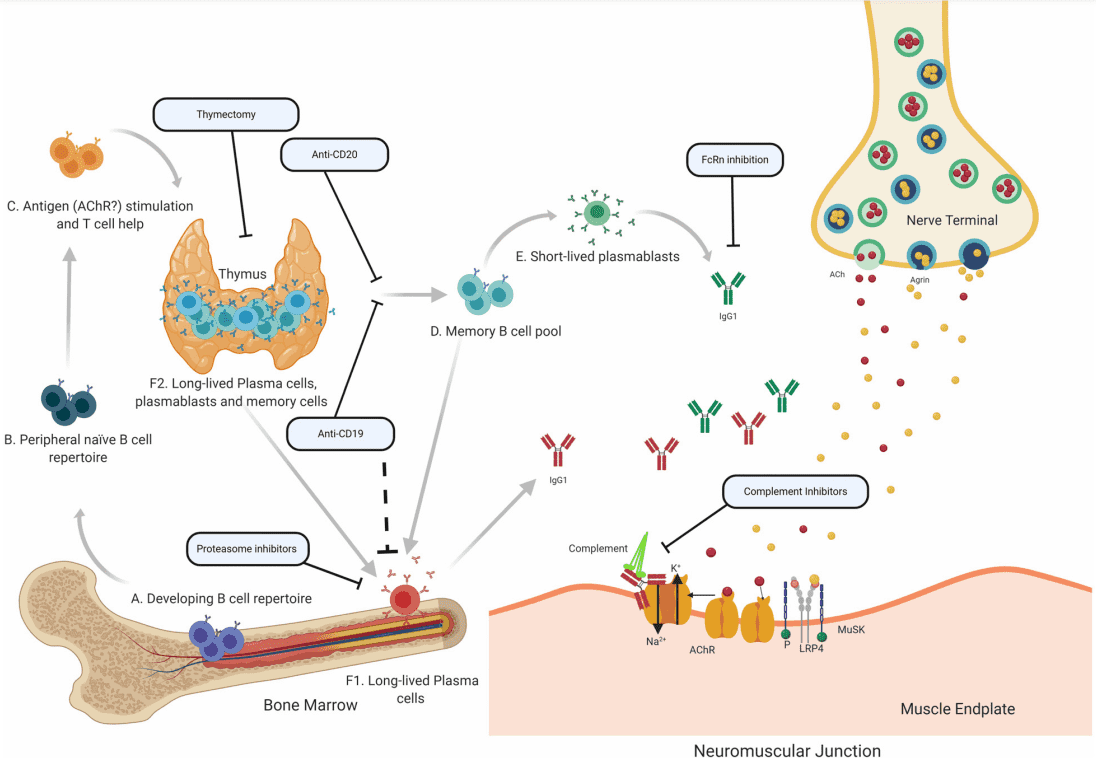NAA and Myasthenia Gravis
Natural autoantibodies (NAA) are closely related to the pathogenesis and treatment of myasthenia gravis (MG). Creative Biolabs is a leading provider of NAA testing and analysis services. We have a team of experienced professionals and an advanced technology platform to provide a full range of NAA services for MG research.
Description of MG
MG is a rare autoimmune disorder of neuromuscular junction, it is an antibody-mediated disorder. The majority of affected individuals will have antibodies against the acetylcholine receptor (AChR) or muscle-specific kinase. MG results in painless muscular weakness and fatigability of voluntary muscles, which are the sole disease manifestations. MG causes painless muscle weakness and voluntary muscle fatigue, which are the only manifestations of the disease. MG treatment mainly consists of symptom management with anticholinesterase drugs, with steroids and other immunosuppressants in more severe cases. Based on aetiology, MG can be further classified as acquired autoimmune, transient neonatal produced by anti-AChR antibodies transferred from the mother, drug-induced, and congenital myasthenic syndromes. The therapeutic approach involves 3 different lines: 1) drugs improving neuromuscular transmission; 2) immunomodulating drugs interfering with autoantibody activity on NMJ; and 3) modification of the natural history of the disease.
MG Develop Pathway
The disease pathogenesis has been well characterized and three main autoantibodies have been described: antibodies against the AChR, antibodies against muscle-specific kinase (MuSK), and antibodies against lipoprotein-receptor-related protein 4 (LRP4). B cells are directly involved in the production of AChR antibodies, and AChR specific T cells are thought to be involved in the pathogenesis of MG. The pathogenicity of anti-MuSK antibodies has been controversial. However, MuSK is necessary for agrin-mediated aggregation of AChR on the postsynaptic muscle surface during postsynaptic muscle development. Elucidation of the pathogenetic mechanisms of MG has provided a rationale for the optimization of treatments.
 Fig.1 Speculative mechanisms of AChR MG immunopathology.1
Fig.1 Speculative mechanisms of AChR MG immunopathology.1
NAA Services for MG at Creative Biolabs
- NAA Services for Anti-acetylcholine Receptor (AChR)
- NAA Services for Anti-muscle-specific Tyrosine Kinase (MuSK)
- NAA Services for Anti-lipoprotein-related Protein Receptor 4 (LRP4)
- NAA Services for Anti-ryanodine Receptor (RyR)
- NAA Services for Anti-titin Antibody
- NAA Services for Anti-interferon-α and Interleukin
- NAA Services for Anti-VGKC (Kv1.4)
- NAA Services for Anti-myofibrillar Proteins
MG Related Products at Creative Biolabs
The discovery of autoantibodies has been central to advancing our understanding of MG. Patients with myasthenia have autoantibodies to neuromuscular junction proteins, including nicotinic acetylcholine receptors, muscle-specific kinases, and lipoprotein receptor-associated protein 4. These antibodies are responsible for an autoimmune attack on the neuromuscular junction that interferes with neuromuscular transmission. Creative Biolabs provides a series of NAA detection kits with different targets for NAA related diseases.
MG is known as the disease of old men and young women. Though the disorder has been studied for centuries, the true reason for disease and its pathophysiology still eludes us. But recent advances in molecular biology and diagnostic tools have allowed us to identify many targets for drug therapy and early diagnosis. Creative Biolabs is an innovative, experienced provider of NAA solutions and products. We use our state-of-the-art R&D expertise to help our customers with NAA associated diseases project research.
Reference
- Fichtner, Miriam L., et al. "Autoimmune pathology in myasthenia gravis disease subtypes is governed by divergent mechanisms of immunopathology." Frontiers in Immunology 11 (2020): 776.

